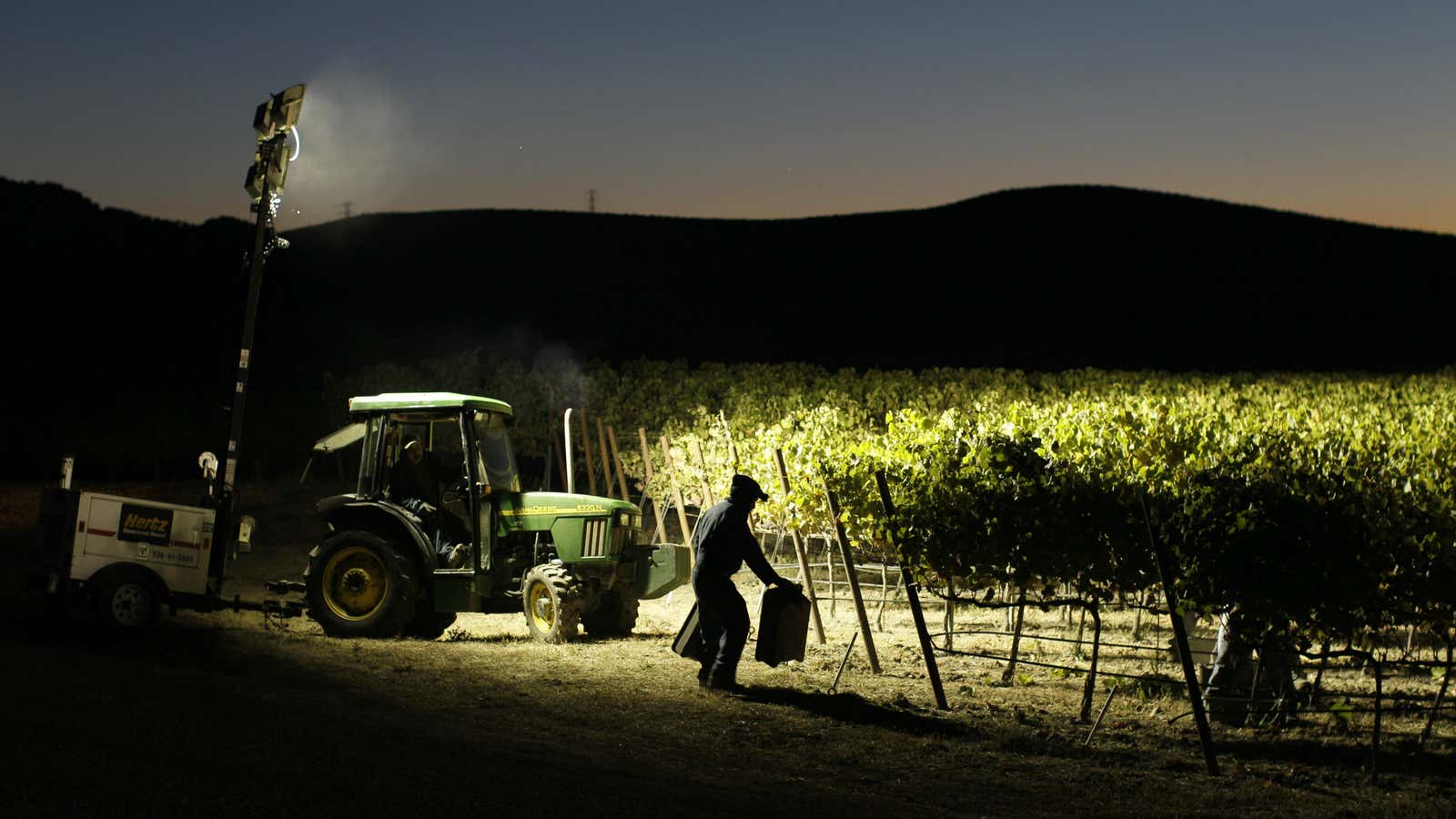Anybody who has struggled to choose a bottle of wine in the US has felt the intense competition of the American wine industry. As W. Chan Kim and Renée Mauborgne write in their book Blue Ocean Strategy, just eight companies control 75% of wine sales in the US. That leaves approximately 1,600 smaller wineries to duke it out for the remaining 25% of sales.
Wineries will stop at nothing to capture the attention of key customer demographics. Just ask the folks at Happy Bitch Wines. “A wine’s label must catch the eye of the customer,” wine sales expert Kyle Vidovich tells Quartz. Vidovich, 29, is a professional merchandizer for the largest wine distributor in the United States, E. & J. Gallo Winery. Gallo’s portfolio includes such mass produced wines such as Barefoot, Boone’s Farm, and Carlo Rossi.
Vidovich suggests that for many wines, the perception of taste, rather than taste itself, is paramount to sales. “Wines that have been rated on a 100-point scale, and wines that have done well in some sort of competition are three times more likely to be bought than wines that do not promote any distinction,” says Vidovich. However, there is a catch. “Rated wines are not necessarily better wines. I have a hard time believing that some wines would actually score so high in any sort of credible competition,” he admits.
Some wineries have turned to celebrities to promote their latest vintage. Drew Barrymore’s name adorns a wine made in Italy. NASCAR star Jeff Gordon’s wine is produced in California, and Republican presidential frontrunner Donald Trump produces his wine just a few miles from “the birthplace of American viticulture,” in rural Virginia.
Ryan Hill—whose Hill Family Estates winery is one of those 1,600 smaller wineries vying for a minority of the market—has worked with his fair share of famous industry outsiders.
Hill found his way into this new style of marketing wines when he and Fender Custom Shop manager Mike Eldred decided to collaborate on a wine staining project. Eldred sent Hill blocks of wood, which Hill stained in wine and sent back to Eldred. Fender, in turn, crafted one hundred guitars out of the stained wood and packaged the guitar with six rare Hill Family Estate wines. The collaboration was a hit. Hill told Quartz that his last guitar-wine package sold for $15,000.
But while Hill found early success with Fender and big name sports stars such as baseball hall-of-famers Tom Glavine and Greg Maddux, collaboration was most fruitful in the unlikeliest of places: the surfing world.
After Hill wine-stained San Diego-area surfer Kyle Knox’s surfboard, the two went on to create a Cabernet-Merlot-Syrah wine called the “Barrel Blend.” A barrel wave is what many surfers will call the perfect wave. For Hill and Knox, the Barrel Blend was the perfect wine.
Since then, Hill Family Estates has won over a cult following with surfers along the California and Florida coasts. Membership in the Hill Family Estate’s wine club has doubled, and sales of Hill’s Barrel Blend has grown by 700% since 2008, according to Hill. Today the Barrel Blend accounts for over 50% of Hill’s total production. Surfers, it turns out, are no longer the stereotypical stoners and beer-drinker of yore.
What differentiates the Barrel Blend from other big name wines in the Hill Family cellar is its accessibility and commitment to quality. The Hill Family has been producing grapes for Napa Valley titans Stag’s Leap and Robert Mondavi for decades. While it is nearly impossible to find a Hill Family wine from the Fender or baseball collaborations at a reasonable price, the Barrel Blend sells at $28 a bottle. Moreover, unlike Drew Barrymore, Jeff Gordon, or Donald Trump, Kyle Knox is more a more approachable face. Knox says it is when people meet him and see how passionate he is about wine, the Barrel Blend sells. When Knox, now 33, retired from professional surfing, he entered the wine business himself.
Along with producing the exponentially popular Barrel Blend, Ryan Hill is now working to put US football player Vernon Davis on a bottle of wine. Davis is hardly the biggest name on his team, the San Francisco 49ers. But that doesn’t matter. In fact, his relative lack of celebrity may even play in the wine’s favor, to replicate the Barrel Blend’s recipe of name-recognition and approachability.
